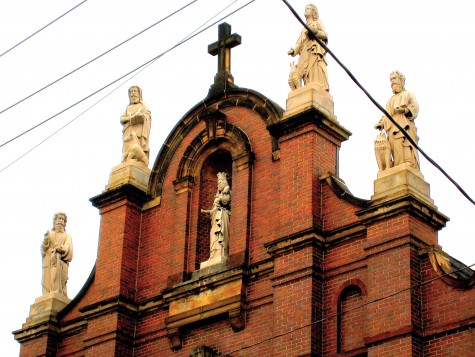
(Editor’s Note: The following essay is taken from City Secrets Books: The Essential Insider’s Guide
edited by Robert Kahn and Mark Strand, a beautifully designed compendium of personal essays recommending little-known or under-appreciated books, published by Fang Duff Kahn. The collection’s 158 contributors include Jane Smiley, Calvin Trillin, C.K. Williams, Deborah Eisenberg and Scott Simon. A portion of the book’s proceeds will be donated to First Book, a national organization that gives children from low-income families the opportunity to read their first new books. This is the second of four essays from the book that will appear on The Second Pass.)
Reviewed:
Earthly Powers by Anthony Burgess
Simon & Schuster, 1980. 607 pp. Currently out of print.
It should not be a mystery why Anthony Burgess is best and often solely known for his 1962 tour de force, A Clockwork Orange. The inventive linguistic play, the attempt to exorcize anxiety about youthful anarchy and Cold War doom, came together like lightning between hard covers. Stanley Kubrick’s indelible movie version starring the cherubically demonic young Malcolm McDowell didn’t hurt the short novel’s fame.
Yet Burgess — who started publishing novels in his forties — was a true original. His oeuvre is vast and intimidating. A composer, a poet, a book reviewer of prodigious breadth and depth, and a linguist, he is difficult to get your arms around. Many of his great works have fallen into neglect: Nothing Like the Sun: A Story of Shakespeare’s Love Life, a masterful and convincing romance as much about language as love; Napoleon Symphony, not only an engaging novel about the Emperor but a brilliant realization of Beethoven’s “Eroica” Symphony; Man of Nazareth, a novel that grew out of writing the teleplay for Franco Zeffirelli’s gorgeous 1977 miniseries, is a dazzling display of erudition, theological rigor, and humanity; the Enderby quartet, four books that redefined the comic novel and raised the bar very high indeed.
Yet Burgess’ Mount Everest must remain Earthly Powers. The plot is simple and simply riveting: an old English novelist happens to be related, by marriage, to the recently deceased Pope. The Pope in question is on the fast track to sainthood. At least three miracles need to have been witnessed for him to be named a saint. Our hero, who has the bad habit of always being in the right place at the right time, just happens to have witnessed all three. The Vatican enlists this decadent, famously homosexual, globe-trotting British novelist in-law of the late Pope to formally document these events. Therefore the novelist embarks on a mission to revisit all the scenes of the “crimes” in order to refresh his memory; hence a journey and a six-hundred-page epic.
Kenneth Toomey is a little bit Somerset Maugham, a little bit Graham Greene, a little bit P. G. Wodehouse, and a little bit James Joyce. He has been everywhere; he has known everyone. These traits make him sometimes annoying, but always fascinating. The book becomes an improbable but convincing history of the mid-twentieth century, from England before and during the Battle of Britain to the demon-ridden jungles of Malaya in the late 1950s to the atrocities of Jonestown, Guyana. The famous names who parade across these pages feel like cameos of the gods and goddesses in The Metamorphoses, golden threads in an enormous tapestry.
Earthly Powers is powerfully audacious, a rare sort of performance rarely attempted these days. Burgess clearly wanted to create a financial locomotive, and he came close. Meant in many ways to be a parody of the long, best-selling tomes of Leon Uris and James Michener, this massive book — with its death-defying prose, sweeping intelligence, sophisticated architecture, and sheer genius with character and place — reaches a level occupied by a rarified few. I suspect that Earthly Powers was the Name of the Rose of its day: a book that many bought but few finished. Not because the book is bad, but because it is a twenty-course meal, including several rich desserts.
In the mix — like fine wine and spirits — is another of Burgess’ obsessions: philosophy and theology. I have encountered few entertaining works that are so serious about the nature of good and evil, the fundamental questions of God’s relationship to man, and the ancient Christian preoccupations over whether a human being can be good. Some long books deserve to be shorter; one is amazed that Burgess got so much into a book shorter than the Bible.
One final note: Burgess/Toomey has a fascination with sesquipedalian words, which will either madden or captivate you. I still have a notebook in which I scribbled the great big or unfamiliar words I encountered when first reading the book (sidereal, micturate, etc.). I see Burgess grinning every time he sends his reader scurrying for a dictionary.
Randall Kenan is the author of five books, including Let the Dead Bury Their Dead and The Fire This Time
. He has been the recipient of a Whiting Writers’ Award, a Guggenheim Fellowship, and the Rome Prize. He is a professor of English and Comparative Literature at the University of North Carolina at Chapel Hill.
Mentioned in this review:
Earthly Powers
A Clockwork Orange
Nothing Like the Sun
Napoleon Symphony
Man of Nazareth
The Enderby Quartet
The Metamorphoses
The Name of the Rose

